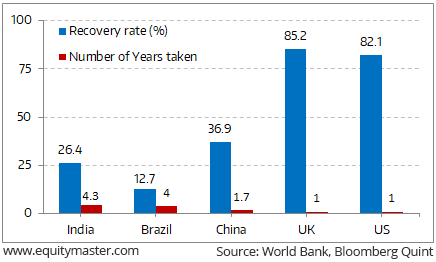- Home
- Todays Market
- Indian Stock Market News December 4, 2017
Indian Indices Trade Marginally Higher; IT Stocks Witness Buying Mon, 4 Dec 11:30 am
Stock markets in India are presently trading marginally higher. Sectoral indices are trading on a positive note with stocks in the IT sector and metal sector witnessing maximum buying interest. Consumer durables stocks are trading in the red.
The BSE Sensex is trading up 139 points (up 0.4%) and the NSE Nifty is trading up 37 points (up 0.4%). The BSE Mid Cap index is trading up by 0.1%, while the BSE Small Cap index is trading up by 0.2%. The rupee is trading at 64.34 to the US dollar.
In the news from the banking space, according to data compiled by credit rating agency ICRA, Indian state-owned banks have written off loans worth Rs 553 billion in the first six months of FY18.
As per the data, PSU banks wrote off Rs 255 bn in the June quarter and Rs 297 bn in the quarter to September, the highest in any quarter.
This comes as banks attempt to clean up their balance sheets after a string of defaults by firms and promoters amidst an economic slowdown.
Also, the write-off comes at a time when banks are struggling to resolve many cases of repayment of loans and recover money stuck with corporate defaulters through insolvency proceedings.
The consensus among bankers is that, given the current trend, the total write-off in FY18 is estimated to top Rs 1 trillion.
Note that the government, in October, announced the recapitalisation plan to inject Rs 2.11 trillion into public sector banks over a period of two years. This move was mainly aimed at resolving the long standing non-performing assets (NPA) problem of PSBs. It is expected to shore up the capital of state-run banks, spurring them to clean up the bad loan mess and revive lending.
The implementation of this initiative will, however, take some time. As a recent edition of The 5 Minute WrapUp states...
- ...if historical data is anything to go by, implementation of such initiatives take a long time, especially in India. Recovery takes the longest time here as compared to other developed nations. India takes an average of 4.3 years to resolve insolvencies as compared to one year in the US. Also, recovery rates in India are amongst the lowest at 26.4%.
This is also evident from the chart below:
Loan Recovery Data of Major Economies

So while recapitalisation will benefit PSBs, it appears to be a temporary cure for a recurring disease. The main problem is the lending and corporate governance processes these banks follow.
In the news from the macroeconomic space, as per an article in the Economic Times, Finance Minister Arun Jaitley is likely to present the country's first post-GST Budget on February next year. The Budget will also be the current government's last full Budget in this financial year.
As per the news, the Budget session of Parliament may begin on January 30 with President Ram Nath Kovind addressing the Joint Session of both the Houses of Parliament.
Furthermore, the Economic Survey, detailing the state of the economy, is likely to be tabled on January 31 and the Union Budget may be presented the following day.
We'll keep you updated on the developments in this space.
For information on how to pick stocks that have the potential to deliver big returns, download our special report now!
Read the latest Market Commentary


Equitymaster requests your view! Post a comment on "Indian Indices Trade Marginally Higher; IT Stocks Witness Buying". Click here!
Comments are moderated by Equitymaster, in accordance with the Terms of Use, and may not appear
on this article until they have been reviewed and deemed appropriate for posting.
In the meantime, you may want to share this article with your friends!